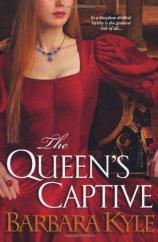Excerpt
Excerpt
The Queen's Captive

The Tower
March 1554
They came for her at dawn.
Through the long, dark hours Elizabeth had stared from the window at the garden made darker by the rain, knowing that if they were coming they would march along the gravel path under the bare, forked fruit trees. For three weeks the Queen’s guards had kept her a prisoner in these remote corner rooms of Whitehall Palace. The patch of winter-dead garden had been all she had been able to see of the grounds. Music and laughter from distant banqueting rooms had reached her faintly, like echoes of the life she had lost.
Voices of the guardsmen at her door made her turn sharply from the window. Two lords of the Queen’s council marched in past the guards. She had been wrong, they had bypassed the garden. Henry Radcliffe, Earl of Sussex, shook rain off his cap with the air of a man irritated at being burdened with unpleasant business. William Paulet, the sixty-year-old Marquis of Winchester, seemed far more troubled by their mission. Stroking rain from his wiry gray beard, he looked at the floor, and Elizabeth knew the old gentleman well enough to realize he was avoiding her eyes. Both men, with their damp garments and grave faces, brought in a chill that reached her like a cold hand at her throat. She had to swallow hard before she found her voice.
“My sister’s reply?”
Sussex clapped his cap back on. Elizabeth felt a jolt of anger. He should be kneeling. They should both be kneeling.
“None, madam.”
“But, my letter ---”
“Her Majesty did not read it.”
It knocked the breath from Elizabeth. One moment --- that was all she had entreated of the Queen. One moment, face-to-face, to swear that she was innocent of any involvement in the rebellion. I pray God that evil persuasions persuade not one sister against the other, she had written. I humbly crave only one word of answer from yourself. But her begging had been for naught. Mary would show no mercy.
Elizabeth stood tall, rallying her courage. She was the daughter of a mighty father, great King Henry the Eighth. She would not let these lords see her terror.
They led her out into the cold March rain. She was twenty years old and on her way to die. They took her down the Thames toward the Tower. She sat shivering in the barge under a dripping canopy, as pewter-cold waves heaved around her, and pewter-gray clouds poured down their frigid rain. Her fingers, gripping the seat edge, were purple with cold. The turbulent river, reeking now at low tide, churned up smells of dead fish and decaying sea matter, turning her stomach. Above the din of waves beating the hull and rain beating the canopy, church bells clanged throughout London. It was Palm Sunday, the beginning of Holy Week. Elizabeth’s pious sister had brought back all the old Catholic rites --- there would be creeping to the cross on Good Friday --- and she and her council had ordered all the people to go to church this morning. “Keep to the church, and carry your palms!” had been the criers’ calls through the muddy streets. An ideal diversion, Elizabeth thought bleakly, for the religious ceremonies would keep Londoners from seeing the barge carry her away. She gazed out at the seemingly deserted capital with its scattered steeples thrusting into the gray sky. All those people crammed into the churches. She thought, Their palm fronds will have wilted in this downpour. Their stick crosses will be soggy relics for Mary’s priests to bless. She imagined them hurrying to get in out of the rain in their wet clothes --- rough, homespun wool on fishwives and apprentices, rich velvets and brocades on the great merchants and their wives, but all of them jostling together, sharing a sense of community that she was now cut off from. She had been arrested at her country home at Ashridge, and when they had brought her into London she had seen the grisly evidence of her sister’s justice. Gallows heavy with decomposing rebel corpses stood at every one of the city’s gates and in all the market squares. Body parts of rebels who had been hanged, drawn, and quartered were strung up along the city walls, a nightmare vision of dismembered arms and legs, the stench making the street dogs howl.
London Bridge emerged ahead through the rain. Its three- and four-story houses and shops looked as deserted as the city streets. Its stone arches bristled with spikes stuck with the gaping heads of rebels. Elizabeth thought she could smell the decaying flesh, putrid on the waterlogged air.
The river, squeezed between the viaduct’s twenty huge arches, roiled in treacherous rapids, and the bargemen squared their feet wide, preparing to “shoot the bridge.” Elizabeth gripped the gunwale to steady herself. The barge rocked and pitched in the angry water as it tumbled through the cavern of the stone arch. The light darkened. The water beat a hollow roar that echoed off the stone. The barge shot out the other side, wallowing in the confused currents, jolting Elizabeth’s neck and knocking her knee against the hull. Her heart thudded as she saw the Tower through the steely curtain of rain. It lay dead ahead on the northern shore. Ancient royal fortress, palace, and prison, its precincts were a labyrinth of stone walls and towers and turrets that rose, massive and forbidding, crushing Elizabeth’s nerve.
Again, she plumbed a wellspring of strength from somewhere deep inside her and summoned defiance. “Not in by Traitor’s Gate, my lords. I am Her Majesty’s true subject and no traitor.”
Winchester’s voice was sad and kind. “Take heart, madam, the tide is with you.” The low water made it impossible to enter by Traitor’s Gate, a water gate. Instead the bargemen were rowing for Tower Wharf. Small victory, Elizabeth thought.
Yet Winchester’s somber face, showing how little he relished his duty, suddenly gave her heart. She had friends. Many friends. Influential men. Lord Admiral Clinton. The Earl of Bedford. Sir Nicholas Throckmorton and Sir Peter Carew and Thomas Parry and John Harrington, and her favorite, the stolid Sir William Cecil. A mad hope swept her. They would rescue her! Yes, Sir William was hiding there in the windswept rain on the wharf, waiting with a troop of soldiers. They would attack her escort and spirit her away to safety!
But no friends came as the two lords marched her across the drawbridge and into the Tower’s western precincts. She splashed through puddles that left her feet and ankles icy. Her sodden cloak, heavy on her shoulders, chilled her to the bone. Loose strands of her red hair plastered her neck, dripping ice water on her skin. The lieutenant of the Tower, Sir John Brydges, met them and led her across the narrow causeway. His soldiers lined the route hemmed in by the high stone walls. Rain drummed their steel helmets. Brydges led the party past the royal menagerie where Elizabeth could hear a lion roar. She did not flinch. She would not show the soldiers her fear.
One of them dropped to his knee and tugged off his helmet as she passed. “God save Your Grace!” he said.
Her heart leapt at this. A few other soldiers pulled off their helmets, too. But the show of loyalty changed nothing for her grim escort, who marched her on. She looked up at the stone walls glinting black with rain. Men were being tortured beyond those walls, she knew, tortured to scream out what they knew of her complicity in Wyatt’s rebellion. Wyatt himself was a prisoner here. So was the mighty Duke of Suffolk. Mighty no more.
She passed under the inner tower they called the Bloody Tower and glimpsed, across the courtyard, the scaffold on Tower Green. Terror stabbed her. Just weeks ago her cousin Lady Jane Gray --- queen for nine chaotic days --- had stumbled up the steps of that scaffold. Trembling, she had groped in confusion for the block on which to lay her head, and the Queen’s executioner had brought his axe thundering down. Pitiful, bewildered Jane, just seventeen years old. Yet the rebels had not fought in her name, but Eliza beth’s. How much more cause, then, did Mary have to hate Elizabeth?
Her bravado suddenly deserted her, and with it all the strength in her legs. She sank down on a wet stone step, shivering, faint with fear, lost. Her fingers groped the grainy stone, her fingernails grating. The icy wetness seeped through to the skin of her thighs, to her very bones. Mary’s hate for her was a well so deep, Wyatt’s treason had merely topped it up. Its wellspring had been Elizabeth’s mother, Anne Boleyn, despised by Mary for supplanting her own mother, Catherine, as Henry’s queen. Mary’s years of suffering before coming to the throne all stemmed from Anne. Now, as Queen, she was going to make Anne’s daughter pay.
“Madam, you cannot tarry here,” Sussex urged.
“Better here than in a worse place!” Elizabeth cried. “For I know not where you are taking me.”
The place they took her, through Coldharbour Gate, was both better and worse. Better, for it was no dungeon or filthy cell but a fine room in the ancient royal palace in the inner ward, a room warmed by a brazier of coals and resplendent with a bed plump with satin cushions and fresh, embroidered linens. Worse, though, because this was the very place where her mother, condemned by the King, her husband, had been lodged before he had executed her. This was Mary’s cruelest blow! Walking in, Elizabeth smelled coal dust and iron filings, and imagined her mother’s terror when she had been brought here, knowing that she would walk out only to her death. Elizabeth had been three years old. Later, she had heard the tales of her mother’s reckless courage in those days. Knowing that the axe of an English executioner sometimes hacked two or three times to finish its grisly job, Anne had demanded that an expert French swordsman be imported to make one clean cut.
The guards shot the great iron bolts of the door behind Elizabeth. No one had come to rescue her. Later that very day she heard drums and commotion as they led out the Duke of Suffolk, and then the executioner’s axe thundered down again. She tried to muster her mother’s courage. She knew she would be the next to die.
Excerpted from The Queen’s Captive © Copyright 2012 by Barbara Kyle. Reprinted with permission by Kensington. All rights reserved.
The Queen's Captive
- paperback: 448 pages
- Publisher: Kensington
- ISBN-10: 075823855X
- ISBN-13: 9780758238559








